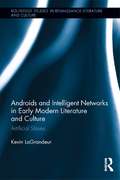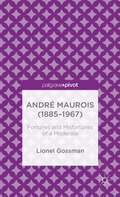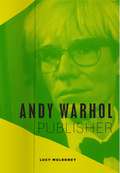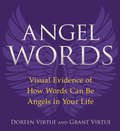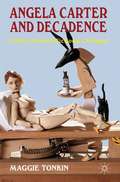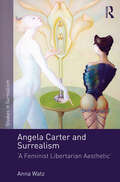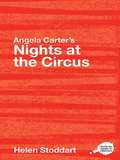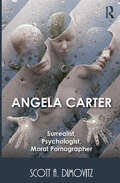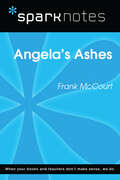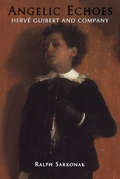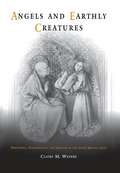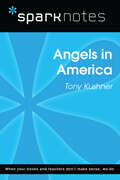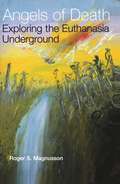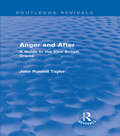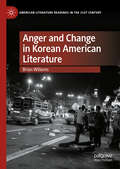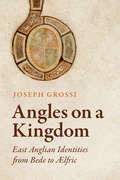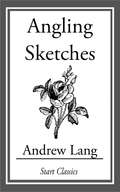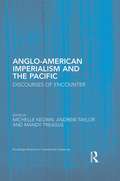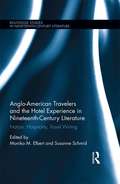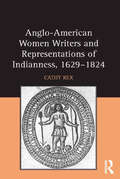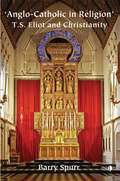- Table View
- List View
Androids and Intelligent Networks in Early Modern Literature and Culture: Artificial Slaves (Routledge Studies in Renaissance Literature and Culture)
by Kevin LaGrandeurAwarded a 2014 Science Fiction and Technoculture Studies Prize Honourable Mention. This book explores the creation and use of artificially made humanoid servants and servant networks by fictional and non-fictional scientists of the early modern period. Beginning with an investigation of the roots of artificial servants, humanoids, and automata from earlier times, LaGrandeur traces how these literary representations coincide with a surging interest in automata and experimentation, and how they blend with the magical science that preceded the empirical era. In the instances that this book considers, the idea of the artificial factotum is connected with an emotional paradox: the joy of self-enhancement is counterpoised with the anxiety of self-displacement that comes with distribution of agency.In this way, the older accounts of creating artificial slaves are accounts of modernity in the making—a modernity characterized by the project of extending the self and its powers, in which the vision of the extended self is fundamentally inseparable from the vision of an attenuated self. This book discusses the idea that fictional, artificial servants embody at once the ambitions of the scientific wizards who make them and society’s perception of the dangers of those ambitions, and represent the cultural fears triggered by independent, experimental thinkers—the type of thinkers from whom our modern cyberneticists descend.
André Breton in Exile: The Poetics of "Occultation", 1941–1947 (Studies in Surrealism)
by Victoria CloustonFollowing the journey of André Breton, the leader of the Surrealist movement, into exile during the Second World War, the author of this book traces the trajectory of his thought and poetic output from 1941–1948. Through a close examination of the major – and as yet little studied – works written during these years, she demonstrates how Breton’s quest for "a new myth" for the postwar world led him to widen his enquiry into hermeticism, myth, and the occult. This ground-breaking study establishes Breton’s profound intellectual debt to 19th-century Romanticism, its literature and thought, revealing how it defined his understanding of hermeticism and the occult, and examining the differences between the two. It shows how, having abandoned political action on leaving the Communist Party in 1935, Breton nonetheless held firmly to political thought, moving in his quest for a better world via Hermes Trismegistus across the utopian ideas of Charles Fourier and the "magical" practices of the Hopi Indians. The author finally reveals Breton’s misreading of the situation in postwar Paris on his return in 1946, and his failure to communicate the span of his ideas for creating a better society while at the same time maintaining a close connection between art and life.
André Maurois (1885–1967): Fortunes and Misfortunes of a Moderate
by Lionel GossmanRespected by his peers and hugely successful internationally in his own time, Andre Maurois is now hardly read. Moderate and conciliatory in everything, including his literary style, he appealed to the educated reader of his time, but did those very qualities prevent him from achieving lasting distinction and impact?
Andy Warhol, Publisher
by Lucy MulroneyAlthough we know him best as a visual artist and filmmaker, Andy Warhol was also a publisher. Distributing his own books and magazines, as well as contributing to those of others, Warhol found publishing to be one of his greatest pleasures, largely because of its cooperative and social nature. Journeying from the 1950s, when Warhol was starting to make his way through the New York advertising world, through the height of his career in the 1960s, to the last years of his life in the 1980s, Andy Warhol, Publisher unearths fresh archival material that reveals Warhol’s publications as complex projects involving a tantalizing cast of collaborators, shifting technologies, and a wide array of fervent readers. Lucy Mulroney shows that whether Warhol was creating children’s books, his infamous “boy book” for gay readers, writing works for established houses like Grove Press and Random House, helping found Interview magazine, or compiling a compendium of photography that he worked on to his death, he readily used the elements of publishing to further and disseminate his art. Warhol not only highlighted the impressive variety in our printed culture but also demonstrated how publishing can cement an artistic legacy.
Angel Words: Visual Evidence Of How Words Can Be Angels In Your Life
by Doreen Virtue Grant VirtueWhen Doreen and her son Grant Virtue were recording podcasts, they noticed that whenever she said the word angel, the recording graphics were shaped like angel wings! So they studied the other words she said and realized that those with a spiritual or loving basis had large graphs. So they experimented with saying negative words and found that their appearance was completely different: tight and small. Similar to Masaru Emoto's work with water crystals, Angel Words gives visual proof of the power and impact of speaking in a loving way. You'll come to understand why positive words express the most energy and therefore have the most power to manifest your dreams. You'll also see how negative words have low energy and read how they can actually draw negative experiences to you. This unforgettable book will immediately motivate you to choose positive words!
Angela Carter and Decadence
by Maggie TonkinBy reading key Carter texts alongside their Decadent intertexts, Tonkin interrogates the claim that Carter was in thrall to a fetishistic aesthetic antithetical to her feminism. Through historical contextualization of the woman-as-doll, muse and femme fatale, Tonkin tests Carter's own description of her fiction as a form of literary criticism.
Angela Carter and Surrealism: 'A Feminist Libertarian Aesthetic' (Studies in Surrealism)
by Anna WatzIn 1972, Angela Carter translated Xavière Gauthier’s ground-breaking feminist critique of the surrealist movement, Surréalisme et sexualité (1971). Although the translation was never published, the project at once confirmed and consolidated Carter’s previous interest in surrealism, representation, gender and desire and aided her formulation of a new surrealist-feminist aesthetic. Carter’s sustained engagement with surrealist aesthetics and politics as well as surrealist scholarship aptly demonstrates what is at stake for feminism at the intersection of avant-garde aesthetics and the representation of women and female desire. Drawing on previously unexplored archival material, such as typescripts, journals, and letters, Anna Watz’s study is the first to trace the full extent to which Carter’s writing was influenced by the surrealist movement and its critical heritage. Watz’s book is an important contribution to scholarship on Angela Carter as well as to contemporary feminist debates on surrealism, and will appeal to scholars across the fields of contemporary British fiction, feminism, and literary and visual surrealism.
Angela Carter's Nights at the Circus: A Routledge Study Guide (Routledge Guides to Literature)
by Helen StoddartA highly original and influential work of modern British literature, Angela Carter’s Nights at the Circus combines a fantastically creative plot with a strong political undertone. The result is an emotive and provocative novel, which has attracted much critical attention from a range of perspectives including poststructuralism, gender studies, postmodernism and psychoanalysis. This guide to Angela Carter’s complex novel, presents: an accessible introduction to the text and contexts of Nights at the Circus a critical history, surveying the many interpretations of the text from publication to the present a selection of new critical essays on the Nights at the Circus, by Heather Johnson, Jeannette Baxter, Sarah Sceats and Helen Stoddart, providing a variety of perspectives on the novel and extending the coverage of key critical approaches identified in the survey section cross-references between sections of the guide, in order to suggest links between texts, contexts and criticism suggestions for further reading. Part of the Routledge Guides to Literature series, this volume is essential reading for all those beginning detailed study of Nights at the Circus and seeking not only a guide to the novel, but a way through the wealth of contextual and critical material that surrounds Carter’s text.
Angela Carter: Surrealist, Psychologist, Moral Pornographer
by Scott DimovitzContributing to the conversation regarding Angela Carter's problematic relationship with what she viewed as the interrelated traditions of surrealism and psychoanalysis, Scott Dimovitz explores the intricate connections between Carter's private life and her public writing. He begins with Carter's assertion that it was through her "sexual and emotional life" that she was radicalized, drawing extensively on the British Library's recently archived collection of Carter's private papers, journals, and letters to show how that radicalization happened and what it meant both for her worldview and for her writings. Through close textual analysis and a detailed study of her papers, Dimovitz analyzes the ways in which this second-wave feminist's explorations of sexuality merged with her investigations into surrealism and psychoanalysis, an engagement that ultimately led to the explosively surreal allegories of Carter's later, more complex, and more accomplished work. His study not only offers a new way to view Carter's oeuvre, but also makes the case for the importance of Angela Carter's vision in understanding the transformations in feminist thinking from the postwar to the postfeminist generation.
Angela's Ashes (SparkNotes Literature Guide Series)
by SparkNotesAngela's Ashes (SparkNotes Literature Guide) by Frank McCourt Making the reading experience fun! Created by Harvard students for students everywhere, SparkNotes is a new breed of study guide: smarter, better, faster. Geared to what today's students need to know, SparkNotes provides: chapter-by-chapter analysis explanations of key themes, motifs, and symbols a review quiz and essay topics Lively and accessible, these guides are perfect for late-night studying and writing papers.
Angelic Echoes: Hervé Guibert and Company
by Ralph SarkonakIn 1990 Hervé Guibert gained wide recognition and notoriety with the publication of "À l'ami qui ne m'a pas sauvé la vie (To the Friend Who Did Not Save My Life)". This novel, one of the most famous AIDS fictions in French or any language, recounts the battle of the first-person narrator not only with AIDS but also with the medical establishment on both sides of the Atlantic. Photography critic for Le Monde from 1977-1985, Guibert was also the co-author (with Patrice Chéreau) of a film script, L'Homme Blessé, which won a César in 1984, and author of more than twenty-five books, eight of which have been translated into English. In this vibrant and unusual study, Ralph Sarkonak examines many intriguing aspects of Guibert's life and production: the connection between his books and his photography, his complex relationship with Roland Barthes and with his friend and mentor Michel Foucault (relationships that were at once literary, intellectual, and personal in each case); the ties between his writing and that of his contemporaries, including Renaud Camus, France's most prolific gay writer; and his development of an AIDS aesthetic. Using close textual analysis, Sarkonak tracks the convolutions of Guibert's particular form of life-writing, in which fact and fiction are woven into a corpus that evolves from and revolves around his preoccupations, obsessions, and relationships, including his problematic relationship with his own body, both before and after his HIV-positive diagnosis. Guibert's work is a brilliant example of the emphasis on disclosure that marks recent queer writing – in contrast to the denial and cryptic allusion that characterized much of the work by gay writers of previous generations. Yet, as Sarkonak concludes, Guibert treats the notions of falsehood and truth with a postmodern hand: as overlapping constructs rather than mutually exclusive ones – or, to use Foucault's expression, as "games with truth."
Angels and Earthly Creatures: Preaching, Performance, and Gender in the Later Middle Ages (The Middle Ages Series)
by Claire M. WatersTexts by, for, and about preachers from the twelfth to the fourteenth centuries reveal an intense interest in the preacher's human nature and its intersection with his "angelic" role. Far from simply denigrating embodiment or excluding it from consideration, these works recognize its centrality to the office of preacher and the ways in which preachers, like Christ, needed humanness to make their performance of doctrine effective for their audiences. At the same time, the texts warned of the preacher's susceptibility to the fleshly failings of lust, vainglory, deception, and greed. Preaching's problematic juxtaposition of the earthly and the spiritual made images of women preachers, real and fictional, key to understanding and exploiting the power, as well as the dangers, of the feminized flesh.Addressing the underexamined bodies of the clergy in light of both medieval and modern discussions of female authority and the body of Christ in medieval culture, Angels and Earthly Creatures reinserts women into the history of preaching and brings together discourses that would have been intertwined in the Middle Ages but are often treated separately by scholars. The examination of handbooks for preachers as literary texts also demonstrates their extensive interaction with secular literary traditions, explored here with particular reference to Chaucer's Canterbury Tales.Through a close and insightful reading of a wide variety of texts and figures, including Hildegard of Bingen, Birgitta of Sweden, and Catherine of Siena, Waters offers an original examination of the preacher's unique role as an intermediary—standing between heaven and earth, between God and people, participating in and responsible to both sides of that divide.
Angels in America (SparkNotes Literature Guide Series)
by SparkNotesAngels in America (SparkNotes Literature Guide) by Tony Kushner Making the reading experience fun! Created by Harvard students for students everywhere, SparkNotes is a new breed of study guide: smarter, better, faster.Geared to what today's students need to know, SparkNotes provides:*chapter-by-chapter analysis *explanations of key themes, motifs, and symbols *a review quiz and essay topics Lively and accessible, these guides are perfect for late-night studying and writing papers.
Angels of Death: Exploring the Euthanasia Underground
by Roger S. MagnussonPublic discussion of euthanasia and assisted suicide is growing. In Australia as elsewhere the debate is difficult, contentious and confronting, and hampered by the secrecy that necessarily surrounds illegal practice. Most people simply have no way of knowing how, and how often, medically assisted death actually occurs.Roger Magnusson presents, for the first time, detailed first-hand accounts by doctors, nurses, therapists and other health professionals who have been participants in assisted death. All have been intimately involved in caring for people with AIDS, both in Australia and in California. He places these ambivalent, self-incriminating accounts within the broader context of the right-to-die debate and the challenges of palliative care.The frankness of the health workers and the richness of their collected evidence set this book apart. From within a culture of deception they speak knowingly and movingly of the merciful release of a peaceful death, while acknowledging the reality of 'botched attempts', euthanasia without consent, precipitative euthanasia, lack of accountability and professional distance, and many other disturbing issues.Angels of Death provides a window into the 'euthanasia underground'—a secret part of medicine and nursing that few professionals will publicly acknowledge. It brings a sense of urgency and precision to public debate, and equips us all to think more independently about these crucial issues.
Angels of Modernism
by Suzanne HobsonAngels of Modernism explores the many and various ways that angels are represented in modernist literary cultures. Seen by the likes of D. H. Lawrence, H. D. and Virginia Woolf as belonging to a religious or Victorian past, the angel might easily have been consigned to history along with other tropes considered too old-fashioned or sentimental for modern(ist) literary tastes. This book argues that it is precisely the angel's lack of fit with self-consciously modern attitudes to art and belief that explains its continued attraction to modernist writers as well as its capacity to generate new meanings. On the one hand, the angel appears as a symbol of resistance to secularizing tendencies in aesthetics and religion. On the other, it is a motile figure appropriated and transformed by a variety of interests from sex-reform campaigners to designers of new utopias. From Walter Benjamin, through Djuna Barnes, H. D. , D. H. Lawrence, Wyndham Lewis, Wallace Stevens and Virginia Woolf, angels continue to perform cultural and critical work even as they are identified as incongruous and untimely.
Anger and After: A Guide to the New British Drama (Routledge Revivals)
by John Russell TaylorWhen it was first published in 1962, Anger and After was the first comprehensive study of the dramatic movement which began in 1956 with the staging of John Osborne’s Look Back in Anger and has since brought forward such dramatists as Brendan Behan, Harold Pinter, N. F. Simpson, John Arden and Arnold Wesker. Thoroughly revised in 1969, this book remains important reading for theatre students in need of a comprehensive and authoritative guide to post-Osborne drama in Britain.
Anger and Change in Korean American Literature (American Literature Readings in the 21st Century)
by Brian WillemsThis book illustrates how Korean American novels and poetry use anger to enact change, foregrounding the various ways it can pinpoint injustice and suggest alternatives. Experiences of the "forgotten" Korean War, Korean military-mediated immigration to the US in the twentieth century, and the role of Korean Americans in some of the largest upheavals in American history all inform a specific relation to anger and both its expression and use in Korean American literature. Through various texts comprised of both poetry and prose from authors including Steph Cha, Cathy Park Hong, Eugene Lim, and Yongsoo Park, Willems highlights how anger is seen to function in some contexts as a positive fulcrum for change.
Angles on a Kingdom: East Anglian Identities from Bede to Ælfric
by Joseph GrossiFrom the eighth century to the turn of the millennium, East Anglia had a variety of identities thrust upon it by authors of the period who envisioned a unified England. Although they were not regional writers in the modern sense, Bede, Felix, the annalists of the Anglo-Saxon Chronicle, King Alfred of Wessex, Abbo of Fleury, and Ælfric of Eynsham took a keen interest in East Anglia, especially in its potential to undo English cultural cohesiveness as they imagined it. Angles on a Kingdom argues that those authors treated East Anglia as both a hindrance and a stimulus to the development of early English "national" consciousness. Combining close textual reading with consideration of early medieval barrow burials, coinage, border delineation, and rivalries between monastic houses, Joseph Grossi examines various forms of cultural affirmation and manipulation. Angles on a Kingdom shows that, over the course of roughly two and a half centuries, the literary metamorphoses of East Anglia hint at the region’s recurring tensions with its neighbours – tensions which suggest that writers who sought to depict a coherent England downplayed what they deemed to be dangerous impulses emanating from the island’s easternmost corner.
Angling Sketches
by Andrew LangAndrew Lang (1844-1912) was a prolific Scots man of letters, a poet, novelist, literary critic and contributor to anthropology. He now is best known as the collector of folk and fairy tales. As a journalist, poet, critic and historian, he soon made a reputation as one of the ablest and most versatile writers of the day. Lang was one of the founders of the study of "Psychical Research," and his other writings on anthropology include The Book of Dreams and Ghosts (1897), Magic and Religion (1901) and The Secret of the Totem (1905). He was a Homeric scholar of conservative views. Other works include Homer and the Epic (1893); a prose translation of The Homeric Hymns (1899), with literary and mythological essays in which he draws parallels between Greek myths and other mythologies; and Homer and his Age (1906). He also wrote Ballades in Blue China (1880) and Rhymes la Mode (1884).
Anglo-American Imperialism and the Pacific: Discourses of Encounter (Routledge Research in Postcolonial Literatures)
by Andrew Taylor Michelle Keown Mandy TreagusThis interdisciplinary collection explores the confluence of American and British (neo)imperalism in the Pacific, as represented in various forms of Pacific discourse including literature, ethnography, film, painting, autobiography, journalism, and environmental discourse. It investigates the alliances and rivalries between these two colonial powers during the crucial transition period of the early-to-mid twentieth century, also exploring indigenous Pacific responses to Anglo-American imperialism during and beyond the decolonization period of the late twentieth century. While the relationship between Britain and the US has been analyzed through prominent forms of economic and cultural exchange between Europe, Africa, and the Americas, there is to date no sustained study of the relationship between British and US colonial expansion into the Pacific, which became central to ideas of developing ‘European’ modernity in the late eighteenth century and has played a pivotal in the history of Anglo-American colonialism, from the establishment of plantation economies and settler colonies in the nineteenth century to various forms of military imperialism during and beyond the twentieth century. The wide range of discursive and expressive modes explored in this collection makes for a rich and multifaceted analysis of representations of, and responses to, Anglo-American imperialism, and is in keeping with the current interdisciplinary turn in postcolonial studies.
Anglo-American Travelers and the Hotel Experience in Nineteenth-Century Literature: Nation, Hospitality, Travel Writing (Routledge Studies in Nineteenth Century Literature)
by Susanne Schmid Monika M ElbertThis volume examines the hotel experience of Anglo-American travelers in the nineteenth century from the viewpoint of literary and cultural studies as well as spatiality theory. Focusing on the social and imaginary space of the hotel in fiction, periodicals, diaries, and travel accounts, the essays shed new light on nineteenth-century notions of travel writing. Analyzing the liminal space of the hotel affords a new way of understanding the freedoms and restrictions felt by travelers from different social classes and nations. As an environment that forced travelers to reimagine themselves or their cultural backgrounds, the hotel could provide exhilarating moments of self-discovery or dangerous feelings of alienation. It could prove liberating to the tourist seeking an escape from prescribed gender roles or social class constructs. The book addresses changing notions of nationality, social class, and gender in a variety of expansive or oppressive hotel milieu: in the private space of the hotel room and in the public spaces (foyers, parlors, dining areas). Sections address topics including nationalism and imperialism; the mundane vs. the supernatural; comfort and capitalist excess; assignations, trysts, and memorable encounters in hotels; and women’s travels. The book also offers a brief history of inns and hotels of the time period, emphasizing how hotels play a large role in literary texts, where they frequently reflect order and disorder in a personal and/or national context. This collection will appeal to scholars in literature, travel writing, history, cultural studies, and transnational studies, and to those with interest in travel and tourism, hospitality, and domesticity.
Anglo-American Women Writers and Representations of Indianness, 1629-1824
by Cathy RexExamining the appropriations and revisions of Indian identity first carried out by Anglo-American engravers and later by early Anglo-American women writers, Cathy Rex shows the ways in which iconic images of Native figures inform not only an emerging colonial/early republican American identity but also the authorial identity of white women writers. Women such as Mary Rowlandson, Ann Eliza Bleecker, Lydia Maria Child, and the pseudonymous Unca Eliza Winkfield of The Female American, Rex argues, co-opted and revised images of Indianness such as those found in the Massachusetts Bay Colony seal and the numerous variations of Pocahontas’s image based on Simon Van de Passe’s original 1616 engraving. Doing so allowed them to posit their own identities and presumed superiority as American women writers. Sometimes ugly, occasionally problematic, and often patently racist, the Indian writings of these women nevertheless question the masculinist and Eurocentric discourses governing an American identity that has always had Indianness at its core. Rather than treating early American images and icons as ancillary to literary works, Rex places them in conversation with one another, suggesting that these well-known narratives and images are mutually constitutive. The result is a new, more textually inclusive perspective on the field of early American studies.
Anglo-Catholic in Religion: T. S. Eliot and Christianity
by Barry SpurrBarry Spurr's eagerly-awaited, definitive study of T. S. Eliot's Anglo-Catholic belief and practice shows how the poet's religion shaped his life and work for almost forty years, until his death in 1965. The author examines Eliot's formal adoption of Anglo-Catholicism, in 1927, as the culmination of his intellectual, cultural, artistic, spiritual and personal development to that point. This book presents the first detailed analysis of the unique influence that Anglo-Catholicism's doctrinal and devotional principles, and its social teaching, had on Eliot's poetry, plays, prose and personal life. An informed presentation and discussion of Anglo-Catholicism at the time of Eliot's conversion and through the subsequent decades of his Christian faith and practice. Significant new material from correspondence and diaries which sheds light on Eliot's thought, poetry and prose. This book is essential reading for all scholars and readers of T. S. Eliot and his circle; for students and devotees of Anglo-Catholicism, and scholars of the interaction between literature and theology, especially in the twentieth century. It will also be of use to senior and Honours-level undergraduates and postgraduate research students working in the fields of Modernism and its principles and belief systems, and for students of religion, especially Western Christianity and Anglicanism.
